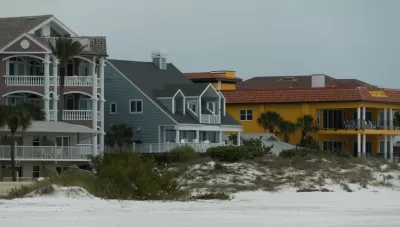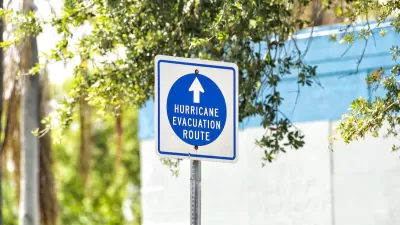The U.S. Corps of Engineers and Redington Shores, Florida are at a standstill: The Corps won’t spend public money to restore private beaches, and homeowners are refusing to grant public access to the beaches behind their home in return for federal assistance.

Redington Shores, Florida, a “well-heeled beach town in Pinellas County” have a problem: the beach between them and the Gulf of Mexico is disappearing fast. According to a Grist article by Jake Bittle, “A series of storms, culminating in last fall’s Hurricane Idalia, have eroded most of the sand that protects Redington Shores and the towns around it, leaving residents just one big wave away from water overtaking their homes.”
The federal government, specifically the U.S. Corps of Engineers, has offered to haul in $42 million of new sand on the condition that 461 of waterfront homeowners provide public points of access to the beaches behind their homes. Pinnellas County officials tried to get homeowners to sign the easements, but half of the homeowners refuse.
“This situation highlights growing tensions between the federal government and homeowners in coastal areas that are threatened by climate change. As sea levels have risen and strong storms have caused greater damage than ever before, the costs of protecting and insuring beachfronts in Florida and other states have increased rapidly,” Bittle writes. He reports that the Corps put the easement policy in place decades ago so that it didn’t spent public money to restore private beaches.
Local and federal officials worry that Redington Shores, Florida, and areas like it where homeowners are more concerned about views and privacy than their homes being decimated are “sitting ducks for the next climate-fueled storm.” But for now, neither the Corps nor the coastal homeowners are willing to budge.
Updated on June 7, 2024 at 4:30 Eastern to reflect that the story was originally published by Grist. We first attributed it to Fast Company, which ran the it as a reprint.
FULL STORY: The homeowner mutiny leaving Florida cities defenseless against hurricanes

Alabama: Trump Terminates Settlements for Black Communities Harmed By Raw Sewage
Trump deemed the landmark civil rights agreement “illegal DEI and environmental justice policy.”

Planetizen Federal Action Tracker
A weekly monitor of how Trump’s orders and actions are impacting planners and planning in America.

The 120 Year Old Tiny Home Villages That Sheltered San Francisco’s Earthquake Refugees
More than a century ago, San Francisco mobilized to house thousands of residents displaced by the 1906 earthquake. Could their strategy offer a model for the present?

Opinion: California’s SB 79 Would Improve Housing Affordability and Transit Access
A proposed bill would legalize transit-oriented development statewide.

Record Temperatures Prompt Push for Environmental Justice Bills
Nevada legislators are proposing laws that would mandate heat mitigation measures to protect residents from the impacts of extreme heat.

Downtown Pittsburgh Set to Gain 1,300 New Housing Units
Pittsburgh’s office buildings, many of which date back to the early 20th century, are prime candidates for conversion to housing.
Urban Design for Planners 1: Software Tools
This six-course series explores essential urban design concepts using open source software and equips planners with the tools they need to participate fully in the urban design process.
Planning for Universal Design
Learn the tools for implementing Universal Design in planning regulations.
Clanton & Associates, Inc.
Jessamine County Fiscal Court
Institute for Housing and Urban Development Studies (IHS)
City of Grandview
Harvard GSD Executive Education
Toledo-Lucas County Plan Commissions
Salt Lake City
NYU Wagner Graduate School of Public Service





























